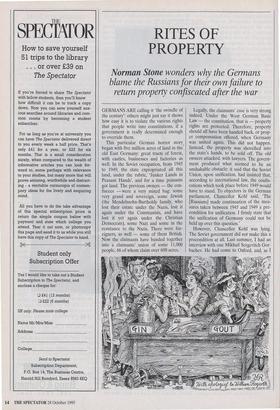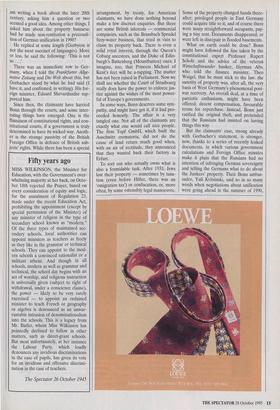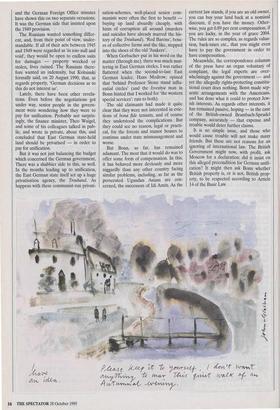RITES OF PROPERTY
Norman Stone wonders why the Germans blame the Russians for their own failure to return property confiscated after the war
GERMANS ARE calling it 'the swindle of the century': others might just say it shows how easy it is to violate the various rights that people write into constitutions, if a government is really determined enough to override them.
This particular German horror story, began with five million acres of land in the old East Germany: great tracts of forest, with castles, businesses and factories as well. In the Soviet occupation, from 1945 to 1949, the state expropriated all this land, under the rubric, `Junker Lands in Peasant Hands', and for a time peasants got land. The previous owners — the con- fiscees — were a very mixed bag: some very grand and sovereign, some Jewish (the Mendelssohn-Bartholdy family, who lost their estate under the Nazis, lost it again under the Communists, and have lost it yet again under the Christian Democrats), some Nazi and some in the resistance to the Nazis. There were for- eigners, as well — some of them British. Now the claimants have banded together into a claimants' union of some 11,000 people, 66 of whom claim over 600 acres.
Legally, the claimants' case is very strong indeed. Under the West German Basic Law — the constitution, that is — property rights are protected. Therefore, property should all have been handed back, or prop- er compensation offered, when Germany was united again. This did not happen. Instead, the property was shovelled into the state's hands, to be sold off. The old owners attacked, with lawyers. The govern- ment produced what seemed to be an unshakable obstacle: it said that the Soviet Union, upon unification, had insisted that, according to international law, the confis- cations which took place before 1949 would have to stand. To objectors in the German parliament, Chancellor Kohl said, 'The [Russians] made continuation of the mea- sures taken between 1945 and 1949 a pre- condition for unification. I firmly state that the unification of Germany could not be held up over this question.'
However, Chancellor Kohl was lying. The Soviet government did not make this a precondition at all. Last summer, I had an interview with one Mikhail Sergevitch Gor- bachev. He had come to Oxford, and, as I am writing a book about the later 20th century, asking him a question or two seemed a good idea. Among other things, I asked him about the property business: had he made non-restitution a precondi- tion of German unification in 1990?
He replied at some length (Gorbyese is not the most succinct of languages). More or less, he said the following: 'This is not so „ There was an immediate row in Ger- many, when I told the Frankfurter Allge- »wine Zeitung and Die Welt about this, but Gorbachev stood by what he had said (I have it, and confirmed, in writing). His for- eign minister, Eduard Shevardnadze sup- ported him.
Since then, the claimants have harried Bonn through the courts, and some inter- esting things have emerged. One is the flimsiness of constitutional rights, and con- stitutional courts, if a government is truly determined to have its wicked way. Anoth- er is the strange passivity of the British Foreign Office in defence of British sub- jects' rights. While there has been a special arrangement, by treaty, for American claimants, we have done nothing beyond make a few discreet enquiries. But there are some British interests — commercial companies, such as the Brambach Sprudel fizzy-water business, that tried in vain to claim its property back. There is even a solid royal interest, through the Queen's Coburg ancestors, and the Duke of Edin- burgh's Battenberg (Mountbatten) ones; I imagine, too, that Princess Michael of Kent's feet will be a-tapping. The matter has not been raised in Parliament. Now we shall see whether the Court of Strasbourg really does have the power to enforce jus- tice against the wishes of the most power- ful of Europe's governments.
In some ways, Bonn deserves some sym- pathy, and might have got it, if it had pro- ceeded honestly. The affair is a very tangled one. Not all of the claimants are exactly what one would call nice people. The firm Topf GmbH, which built the Auschwitz crematoria, did not do the cause of land return much good when, with an air of rectitude, they announced that they wanted back their factory in Erfurt.
To sort out who actually owns what is also a formidable task. After 1933, Jews lost their property — sometimes by taxa- tion (even before Hitler, there was an `emigration tax') or confiscation, or, more often, by some ostensibly legal manoeuvre. Some of the property changed hands there- after; privileged people in East Germany could acquire title to it; and of course there were many straightforward occupants, pay- ing a tiny rent. Documents disappeared, or were left in disrepair in flooded basements.
What on earth could be done? Bonn might have followed the line taken by the constitutional expert Professor Rupert Scholz and the advice of the veteran WIrtschaftswunder banker, Herman Abs, who told the finance minister, Theo Waigel, that he must stick to the law: the sanctity of property was, after all, the very basis of West Germany's phenomenal post- war recovery. An overall deal, at a time of patriotic enthusiasm, might have been offered: decent compensation, favourable terms for repurchase. Instead, Bonn just ratified the original theft, and pretended that the Russians had insisted on having things this way.
But the claimants' case, strong already with Gorbachev's statement, is stronger, now, thanks to a series of recently leaked documents, in which various government calculations and Foreign Office minutes make it plain that the Russians had no intention of infringing German sovereignty and telling the Germans what to do about the Junkers' property. Their Bonn ambas- sador, Yuli Kvitsinski, said so in so many words when negotiations about unification were going ahead in the summer of 1990, and the German Foreign Office minutes have shown this on two separate occasions. It was the German side that insisted upon the 1949 provision.
The Russians wanted something differ- ent, and, from their point of view, under- standable. If all of their acts between 1945 and 1949 were regarded as 'in Coto null and void', they would be open to endless suits for damages — property wrecked or stolen, lives ruined. The Russians there- fore wanted an indemnity, but Kvitsinski formally said, on 20 August 1990, that, as regards property, 'German decisions as to this do not interest us'.
Lately, there have been other revela- tions. Even before the negotiations got under way, senior people in the govern- ment were wondering how they were to pay for unification. Probably not surpris- ingly, the finance minister, Theo Waigel, and some of his colleagues talked in pub- lic, and wrote in private, about this, and concluded that East German state-held land should be privatised — in order to pay for unification.
But it was not just balancing the budget which concerned the German government, There was a shabbier side to this, as well. In the months leading up to unification, the East German state itself set up a huge privatisation agency, the Treuhand. As happens with these communist-run privati- sation-schemes, well-placed senior com- munists were often the first to benefit buying up land absurdly cheaply, with hints of corruption all around (murders and suicides have already marred the, his- tory of the Treuhand). 'Red Barons', boss- es of collective farms and the like, stepped into the shoes of the old 'Junkers'.
When Gorbachev put in his word on the matter (through me), there was much mut- tering in East German circles. I was rather flattered when the second-to-last East German leader, Hans Modrow, opined that 'behind Professor Stone stand influ- ential circles' (and the Izvestiya man in Bonn hinted that I worked for 'the western special services': rats to both).
The old claimants had made it quite clear that they were not interested in evic- tions of bona fide tenants, and of course they understood the complications. But they could see no reason, legal or practi- cal, for the forests and manor houses to continue under state mismanagement and worse.
But Bonn, so far, has remained adamant. The most that it would do was to offer some form of compensation. In this, it has behaved more deviously and more niggardly than any other country facing similar problems, including, as far as the persecuted Ugandan Asians are con- cerned, the successors of Idi Amin. As the current law stands, if you are an old owner, you can buy your land back at a nominal discount, if you have the money. Other- wise, you get 0.89 per cent compensation, if you are lucky, in the year of grace 2004. The rules are so complex, as regards valua- tion, back-taxes etc., that you might even have to pay the government in order to have compensation.
Meanwhile, the correspondence columns of the press have an organ voluntary of complaint, the legal experts are over- whelmingly against the government — and yet the allegedly rights-protecting constitu- tional court does nothing. Bonn made sep- arate arrangements with the Americans, and has done what it could to protect Jew- ish interests. As regards other interests, it has remained passive, hoping — in the case of the British-owned Brambach-Sprudel company, accurately — that expense and trouble would deter further claims.
It is no simple issue, and those who would cause trouble will not make many friends. But these are not reasons for an ignoring of international law. The British Government might now, with profit, ask Moscow for a declaration: did it insist on this alleged precondition for German unifi- cation? It might then ask Bonn whether British property is, or is not, British prop- erty, to be respected according to Article 14 of the Basic Law.




































































 Previous page
Previous page